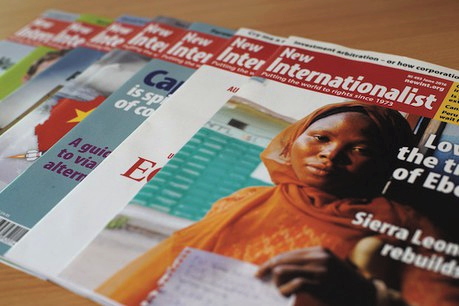Public agencies finance privatization.
Published in the April 2003 issue of the New Internationalist.
For a multinational corporation, moving into a newly-privatized market can be an uncertain proposition. While companies covet prospects for operating in areas formerly served by state-run industries, they fear political instability, unanticipated costs, and popular resistance. Investors are happy to collect profits on successful deals. However, they want the public to cover the risk of things going wrong.
Remarkably, governments often prove happy to comply. One of their favorite tools for subsidizing corporate investments in the developing world is the Export Credit Agency (ECA).
ECAs are public institutions that provide insurance, loans, and loan guarantees to companies expanding their business in emerging markets. The G7 leading industrialized nations each have at least one ECA. Together, the agencies form the world’s largest class of public international financial institutions (IFIs), supporting as much as $391 billion in private sector business and investment in 1998, according to watchdog groups. They are, in the words of one supporter, “the unsung giants of international trade and finance.”
Many IFIs, most notably the World Bank, carry out their activities under the pretense of “poverty reduction.” The ECAs profess no such concern for the world’s poor. Their concern, simply put, is corporate welfare — making sure that companies based in the ECA’s home country thrive overseas. Yet ECAs work in tandem with other IFIs. As Aaron Goldzimer of Environmental Defense explains, institutions like the World Bank, the IMF, and the WTO “open countries up with the trade and economic policies that they impose.” Subsequently, “ECAs provide the direct finance and cover for corporations to go in.”
German, Japanese, US, and Italian ECAs played important roles in privatizing portions of Bolivia’s state oil company. Their financing for pipeline projects—over $650 million since 1997—benefited corporate players such as Enron and Shell, while endangering ecologically sensitive areas like the Pantanal, the world’s largest remaining wetland.
$73.8 million in financing from a US’s Overseas Private Investment Corporation also helped Enron to breach a freshly-opened electricity market in Guatemala, starting in 1992. This process coincided with sharp increases in electricity prices for consumers, which produced mass protests and sparked a crisis within the government.
Beyond their direct involvement in privatization, ECAs make possible some of the dirtiest deals of corporate globalization—including many projects that even the World Bank won’t touch. At a time when wealthy countries scorn nuclear power, ECAs keep the industry alive, supporting 14 of 19 nuclear power plants currently under construction in the developing world. In many years, 30% or more of the guarantees provided by ECAs in France and the UK serve to finance arms sales. And despite being plagued with corruption and receiving damning environmental impact assessments, construction on China’s massive Three Gorges Dam moves forward, thanks to export credit contributions from countries including Canada, Germany, Sweden, and Switzerland.
Responding to these abuses, 347 organizations in 50 countries endorsed the Jakarta declaration, a set of demands drafted by NGO and social movement representatives in May 2000. The declaration calls for cancellation of the huge portion of the developing world’s foreign debt held by ECAs. It insists upon binding environmental, social, and human rights guidelines. And it demands that ECAs adopt transparent procedures to end the secrecy that has hidden many deals from public scrutiny.
Uniform demands allow activists to move beyond making reforms in individual countries, and to instead work to prevent any ECA from financing objectionable projects. In a recent victory, the growing campaign prevented construction of the Ilisu Dam in Turkey, which would have displaced 78,000 people, primarily ethnic Kurds.
If this movement continues to build power internationally, unchecked public financing for corporate expansion may become a thing of the past — a development that would leave “privatization” with an uncertain future.
